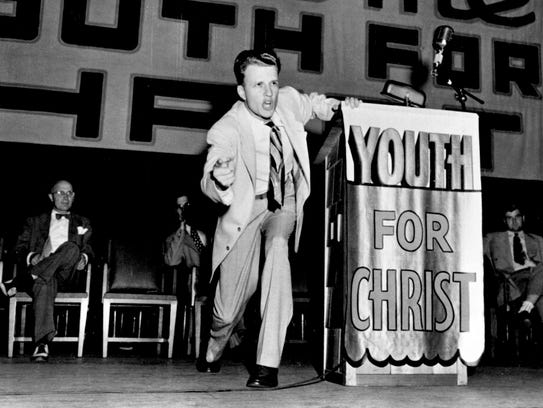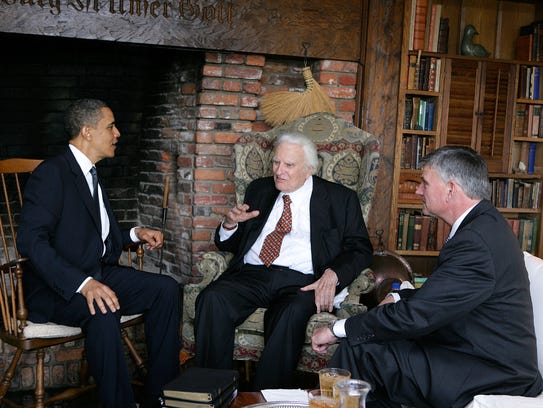Photo: Larry W. Smith, Getty Images)
The world's best-known evangelist, the Rev. Billy Graham, has died. He was 99.
From
the gangly 16-year-old baseball-loving teen who found Christ at a tent
revival, Graham went on to become an international media darling, a
preacher to a dozen presidents and the voice of solace in times of
national heartbreak. He was America's pastor.
Graham retired
to his mountain home at Montreat, N.C., in 2005 after nearly six
decades on the road calling people to Christ at 417 all-out preaching
and musical events from Miami to Moscow. His final New York City crusade
in 2005 was sponsored by 1,400 regional churches from 82 denominations.
Presidents
called on Graham in their dark hours, and uncounted millions say he
showed them the light. He took his Bible to the ends of the Earth in
preaching tours he called "crusades." Even now, anywhere a satellite,
radio, TV, video or podcast can reach, his sonorous voice is probably
still calling someone to Christ.
Though
Graham's shoes could likely never be filled, his son, Franklin, has
taken over in some aspects—leading The Billy Graham Evangelistic
Association and becoming a confidant of President Donald Trump,
including speaking at his inauguration.
But Franklin's message has swayed from his father's, leaving a mixed legacy for the Graham name.
Franklin
has mocked both Islam and LGBT rights. He uses his following on social
media to raise funds for "persecuted Christians," boycotts businesses
that use gay couples in advertisements and blasts the separation of
church and state as as the godless successor to Cold War communism.
But his father's words for years offered peace and perspective.
On
the National Day of Prayer and Remembrance following the 9/11 attacks,
Billy Graham spoke of the "mystery of iniquity and evil," of "the lesson
of our need for each other" and, ultimately, of hope.
"He
was so real, he made Christianity come true." observed Susan Harding,
an anthropologist at the University of California-Santa Cruz. "He was
homespun, historical and newsworthy all at once. He could span the times
from Christ to today, from the globe to you, all in one sentence."
Grant
Wacker, a Duke University professor of Christian history, says Graham
represented, "what most decent churchgoing people thought and ought to
think."
His reputation was untouched by sex or
financial scandals. When anti-Semitic comments came to light as
transcripts of conversations with Richard Nixon surfaced, Graham was
promptly and deeply apologetic.
He never built a
megachurch, set up a relief agency, launched a political lobby or ran
for office. Yet he redefined American Protestant life by popularizing
Christianity's core message — Christ died for your sins — downplaying
denominational details and proclaiming the joys found in faith.
Graham
was, however, drawn to power. Eventually, he met, prayed with,
comforted and joked with 12 U.S. presidents, and Graham learned to walk a
tightrope.
He found a fine balance that allowed him to become America's pastor, Democrat or Republican. North or South.
When
President Clinton's affair with Monica Lewinsky came to light, Graham
called for forgiveness.
Clinton told Peter Boyer of The New Yorker, "He
took sin seriously. But he took redemption seriously. And it was
incredibly powerful the way he did it."
Former
president George W. Bush has said it was a conversation with Graham that
turned him from his drinking ways when he was young.
"I've
never called him on a specific issue but his influence is bigger than a
specific issue, as far as I'm concerned. He warms your soul," Bush told
an ABC 20/20 special on the preacher and politics.
Graham
emphasized the joy to be found in belief, in contrast to evangelists
such as Jerry Falwell and Pat Robertson who routinely issued glowering
condemnations of politicians or blamed natural disasters on modern
culture. However, Graham did take an uncharacteristically political
stand before the 2012 presidential election. He authorized full page ads
in major newspapers in October urging people to vote for politicians
who opposed same-sex marriage on "biblical principles."
He
brought to the microphone a "corny but effective humor," Wacker says,
which made him a convivial talk-show guest. Graham logged more than 50
radio or television interviews with Larry King alone. YouTube has a tape
of Woody Allen interviewing the evangelist, who draws almost as many
laughs as the caustic, agnostic comedian.
The
Billy Graham Evangelistic Association he founded, now led by his son,
Franklin, used every communications innovation possible to carry the
Gospel to any willing heart on Earth. More than 214 million people in
195 cities and territories heard God's call in Graham's voice and
witnessed him deliver the Gospel in person or by satellite links. His
projects included founding Christianity Today magazine in 1956 and writing more than 30 books.
High
among his numerous honors: The Congressional Gold Medal awarded to
Billy and Ruth in 1996, the Presidential Medal of Freedom awarded to him
in 1983, and the Templeton Foundation Prize for Progress in Religion in
1982. He even has a star on the Hollywood Walk of Fame.
"Fundamentalists
saw him as excessively liberal, and liberals saw him as too literalist
in talking about sin and salvation. His wonderful balance between them
is critical to his legacy," says John Wilson, editor of Books & Culture, a sister publication of Christianity Today magazine.
Graham's
last decades were slowed by illness and injury. He was diagnosed with
Parkinson's disease in 1989, felled by broken bones, bouts of
hydrocephalous and rounds of pneumonia.
Graham's last crusade, in June 2005 in New York City,
drew 242,000 people to Flushing Meadows; 8,786 made a new commitment to
Christ and thousands more renewed or rejoiced in their faith.
Then
he retired to his Montreat, N.C., mountaintop log cabin home (where his
five children grew up mostly without their traveling father) to spend
his days with his beloved wife, Ruth. They shared Bible study, devotions
and an endless recycling of the movie musicals she loved to watch.
Those were bittersweet days, with Ruth bedridden and Billy relying on a
walker. Their frequent prayer was, "Help me, Lord."
At her funeral in June 2007, Graham called Ruth the finest Christian he ever knew.
Graham
lived through the explosion of religious diversity in America, the rise
of the human potential movement and the trend to personalized
spirituality. He also lived to see many tire of lonely seeking or a
high-minded hopscotch from church to church, religion to religion.
Yet
he remained steadfast in his response. In 1996, when he and Ruth were
awarded the Congressional Gold Medal, he once more shared his faith in
God with some of the most powerful men on Earth:










